
I Illustrate What Life With Chronic Illness Is Like While I Am Still Able To Draw
This chronic disease leads to complete quadriplegia. This disease began as a foot drop at age 20 and since my body has gotten weaker over time, like a slow-motion blur. Today, I’ve been in a wheelchair for eight years. Last year I graduated from a manual chair to a powered chair. Eight years ago this terminal illness began wasting my upper body including my core, neck, arms, shoulders, hands, and fingers. I am an artist. One day I will be too disabled to draw… among one thousand other things. This is a daily devastating reminder. Despite it, I live my life to the fullest, fully grasping the essence of what time means.
I received a BFA in Automotive and Product Industrial Design while searching for diagnosis during the early stages of this disorder. Over time I’ve become a very active public advocate, eleven years to be exact. In my journey through advocacy, I’ve been a columnist, blogger, speaker, grassroots fundraising and awareness campaign creator, and runner and artist. Everything I have done in eleven years has meant to shed a light on disability and a spotlight on such a rare disease.
I document the progression of my rare disease through unique artwork. A few years ago I shared some of my drawing ideas with Bored Panda. In that time I’ve developed a growing list of chronic symptoms and have been on a 2-3 year diagnosis search, yet again. I’ve been living on another spectrum of disability known as “chronic illness” or “invisible illness”. Even I, as a disabled person, had little knowledge or experience with chronic illness. Now that I am living with it I decided to expand my art to this sect of illness to gain awareness and understanding. Chronic Illnesses like autoimmune disease and cancer are the fastest growing sect of medical health. Please, take a look below as I share what it is and how it feels in new illustrations.
More info: kamredlawsk.com | Instagram | Facebook | twitter.com
Torn
A tale about chronic illness and its rapture (chronic pain, chronic neuropathy, chronic fatigue etc.).
Cellular
“A human body is a conversation going, both within the cells and between the cells, and they’re telling each other to grow and to die; when you’re sick, something’s gone with that conversation.”
-W. Daniel Hillis
Inspired by a microscopic view of white blood cells, nerve bundles, and chronic illness.
White Blood Cells (WBCs) fight infections from bacteria, viruses, fungi and other pathogens. These WBCs are made in the bone marrow & travel in the blood throughout the body. Their job is to sense and destroy pathogens.
But if your body has too few or too many WBCs, then your body goes haywire. Low WBC count can result in cancers like leukemia, lymphoma, and multiple myeloma, and/or result from chemotherapy and radiation. High white blood cells cause breast cancer, colon cancer, blood cancer, cervical cancer, and lung cancer.
Autoimmune disorders (the symptoms I’m experiencing) like MS, Lupus, Sjögren’s, Rheumatoid, Hashimoto, Addison’s and Graves disease, instruct your body to attack and destroy its own WBCs. Cases for each person can range from mild to severe. Viruses can cause low WBCs. A well-known specific kind of WBC is HIV.
Today, 50 million Americans, 80 percent of them women, have one or more autoimmune conditions. Before the ’80s you didn’t really hear of autoimmune disorders. In the ’90s one in 400 people developed an autoimmune disease. Today, it’s one in 12 Americans, and one in nine women have an autoimmune disease. More women are diagnosed each year with autoimmune disease than breast cancer and cardiovascular disease combined.
In this experience, I’ve developed much empathy for those with a chronic and invisible illness.
How It Feels (I)
This drawing tells the tale of nerve pain and how it feels. I have been experiencing mysterious growing chronic symptoms unrelated to my GNE Myopathy. GNEM is a very rare genetic muscle-wasting disorder I’ve lived with for nearly 20 years. Over the past couple of years, I’ve been on an intense diagnosis journey with many specialists who have no answers in sight. Through this experience, I’ve been made aware of another world of disability. It’s known as ‘invisible illness’ or ‘chronic illness, a form of disability that is ever-growing but still largely misunderstood in the public’s eye and in the medical field.
Statistics say, 1 in 2 people (133 million) have a chronic condition. Examples of chronic illnesses are autoimmune diseases, fibromyalgia, Crohn’s disease, Lyme disease, CRPS, chronic fatigue syndrome, Lupus, MS, Ehlers-danlos, cancer, and mental illness. Examples of symptoms are chronic pain, nerve pain, migraines, chronic itching, chronic fatigue, cognitive impairment, depression, and anxiety.
Those with illnesses and disabilities, who deal with chronic pain regularly, are often overlooked, and so once again I’m forced to be my best advocate just like my long and tumultuous journey for my GNE Myopathy diagnosis. I’ve seen many doctors for my growing chronic symptoms like nerve pain, chronic pain, and unrelenting itching but I’ve found no one wants to find out why this is happening and instead feed me painkillers. I’m not satisfied with this kind of care and lack of collaboration among specialists to achieve a diagnosis. I have learned a lot and have much to say about the medical and drug industry field… too long to post here.
How It Feels (II)
This drawing tells the tale of chronic pain and how it feels. During more extreme episodes it feels like a blanket of pain is surrounding me, as if I was covered in bruises. Suffering from chronic illness is physically painful and emotionally exhausting.
One of the main complaints from invisible illness individuals is no one believes them because they look healthy due to symptoms that can’t be seen, only experienced. The usual response is: “but you look so good”. These individuals are often accused of faking or imagining their disabilities but it’s impossible to look at an individual and know they privately suffer from some form of invisible illness.
This experience and lack of public understanding has sparked a desire to open up about this new health issue and draw upon it along with illustrating moments related to my genetic muscle-wasting condition.
Physical health and uncontrollable chronic pain and other chronic symptoms often lead to suicide. Statistics say these are major factors in up to 70% of suicides. The divorce rate among chronically ill is over 75%.
How It Feels (III)
My body feels like a pile of bricks. I often say I feel like I’m dragging around a corpse. As I progress I feel heavier. My limbs feel lifeless and I often envision a hill in the shape of my body with gravestones on top. Between the weakness and the pain, I feel like a dead person. I’m young and yet my body feels as if it has lived 90 years. My body is weary and aged yet my soul feels like a vibrant woman in her 20s. It’s a constant contradiction I try to balance.
Through the years I’ve learned to befriend her, my body, for it’s not her fault this is happening. She weeps when I weep.
Bottled Up
This one is about my muscle wasting disorder and the list of ambiguous chronic symptoms of pain, nerve pain and relentless itching. It’s the physical and emotional repercussions of feeling trapped and limited as I’m caught in the center of turbulence. It’s also what happens when we are emotionally bottled up – keeping ourselves on the inside in fear of vulnerability.
Holding On
Those moments when we are blinded by our struggles, blinded by the past, present and future —unable to see the truth of what we thought was true about life and ourselves — barely holding on.
Painstaking
When I’m experiencing chronic pain I visualize it as a blanket enveloping my entire body. This even applies to lamenting over the loss of my body due to my constantly progressing muscle-wasting disorder.
Physical and emotional pain can visit any one of us. This is how it feels. In these moments all that’s left to do is find beauty… somewhere. Anywhere. This looking at the light is difficult and requires great mental focus, but it’s necessary in order to continue the tether that connects me to this world.
This time I gave a nod to my Korean heritage. The cloak of physical or emotional pain is a loose interpretation of a “hanbok”, a traditional Korean dress. Korea’s National flower is Hibiscus Syriacus or “Rose of Sharon”. The smaller flower graphics is the exact design from my childhood Korean passport when I flew to America at four years old to meet my first family.
Wear your pain when you need to, but don’t forget to keep searching. Keep going.
Self-Doubt
Self-doubt is universal. The phantom of us imposes its will of self-doubt and insecurity. I experience self-doubt all the time as an artist, designer, and disabled person forced to prove their worth in an able-bodied world.
Healing Nature
When you’re feeling trapped in chronic illness, (rare) disease, it’s important to find healthy vices to take your mind off the present pain. One of my vices is nature.
Bathing Woman
This one is about my imaginary life that encroaches on my everyday life and how these worlds intersect. Sometimes I have these waking dreams and reality intertwines – leaving me unable to decipher one from the other. I saw this image while in the bathtub. Vines began growing around me as water cursorily leaked out, leaving me vulnerable. I often use imagination to make sense of what is happening. It’s one of my vices for dealing with present pain and struggle.
13Kviews
Share on FacebookExplore more of these tags
The dragging around a corpse is visceral. I am obsessed with your art. From a fellow chronic illness artist to another, thank you
The dragging around a corpse is visceral. I am obsessed with your art. From a fellow chronic illness artist to another, thank you

 Dark Mode
Dark Mode 

 No fees, cancel anytime
No fees, cancel anytime 






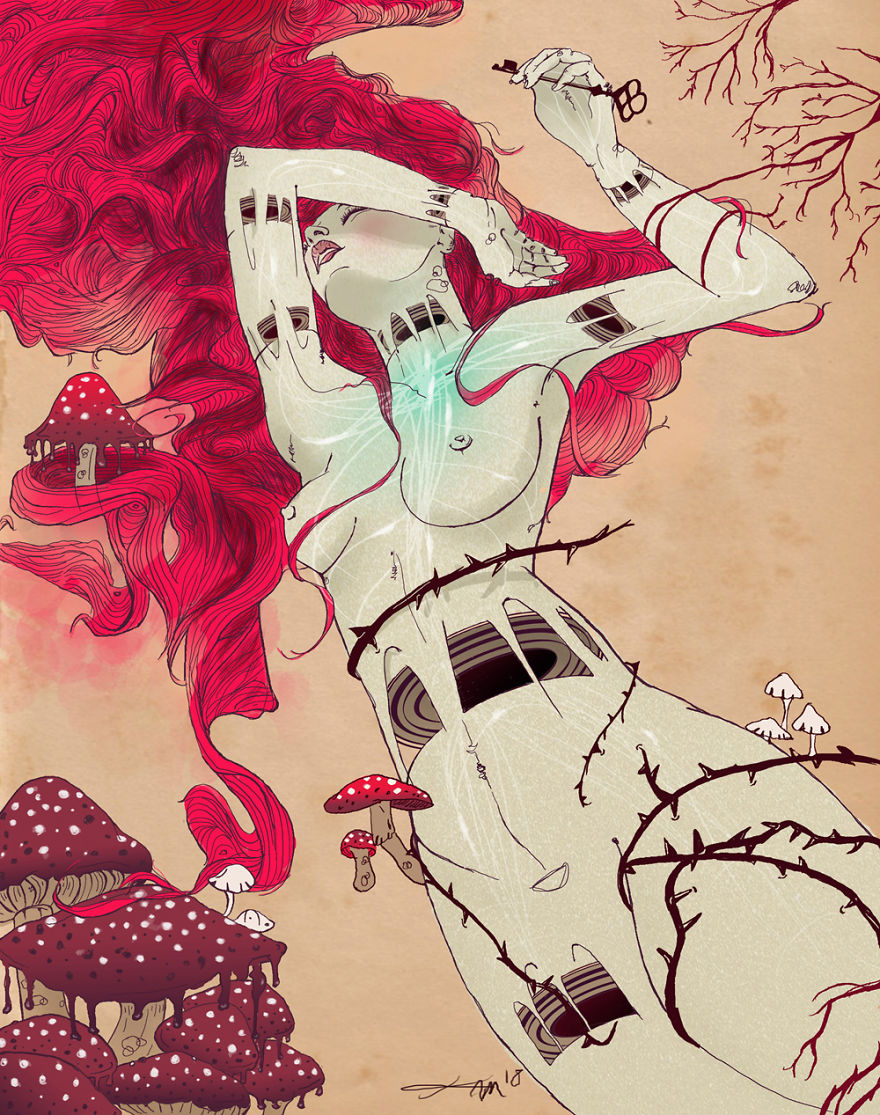
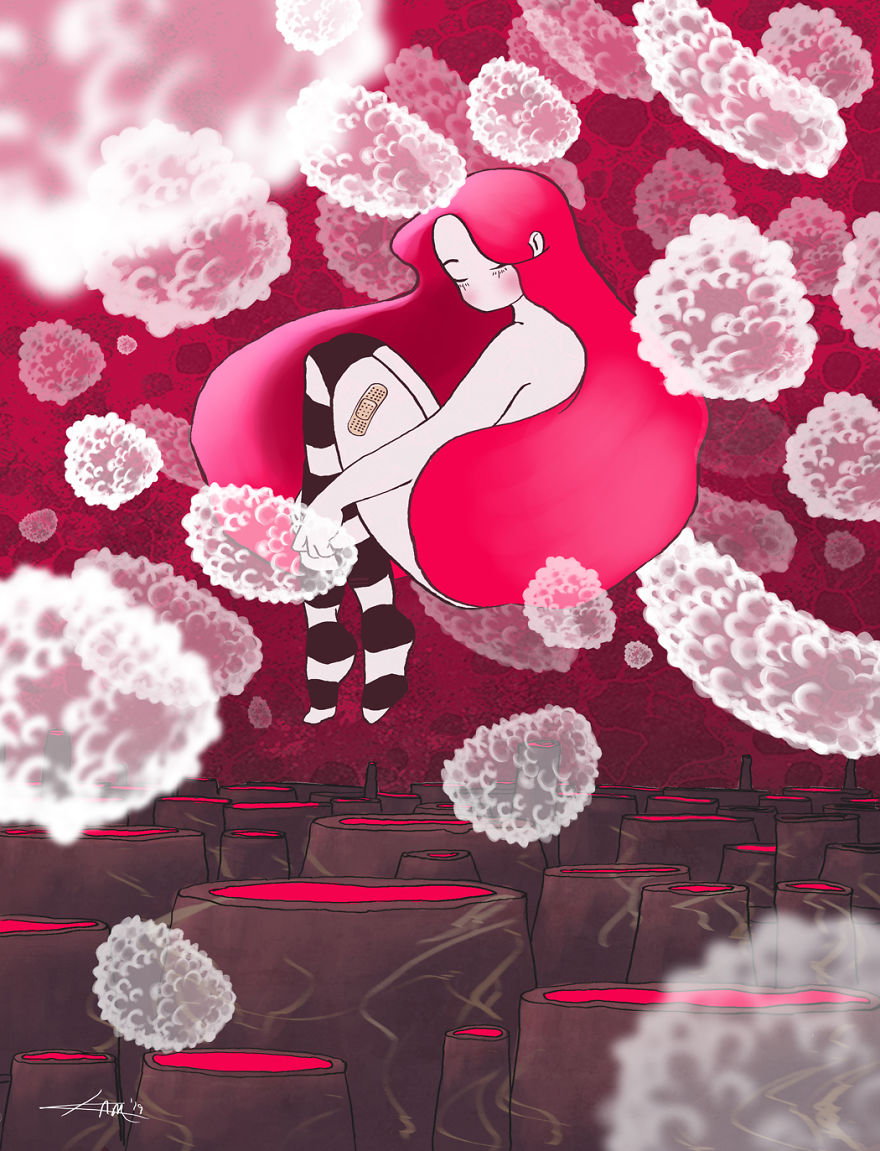


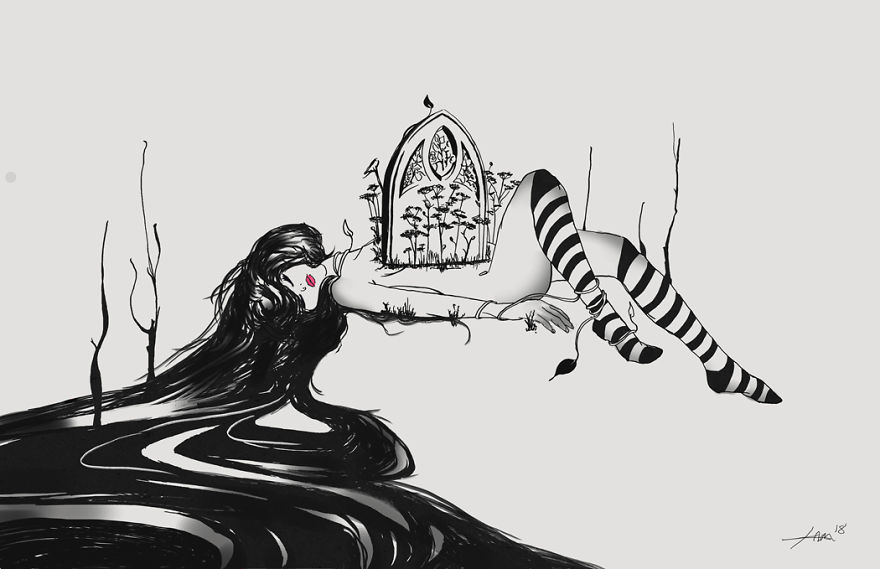
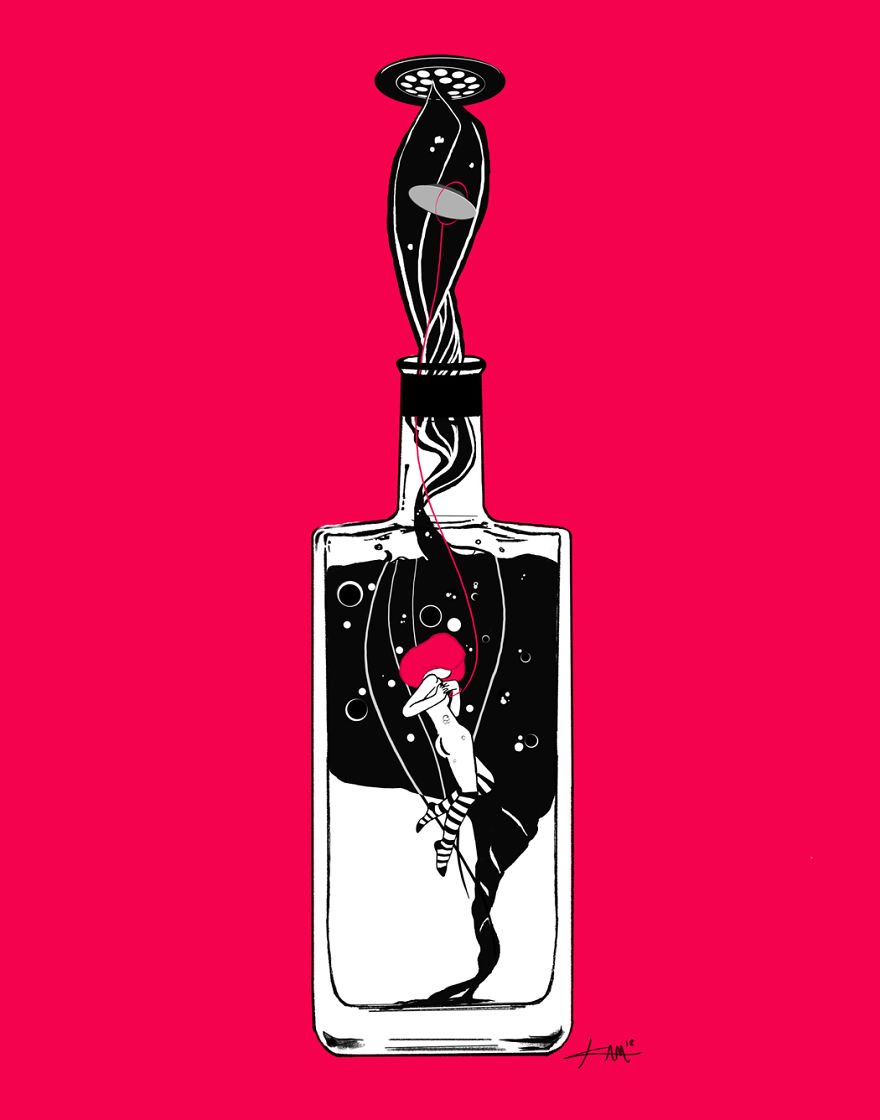
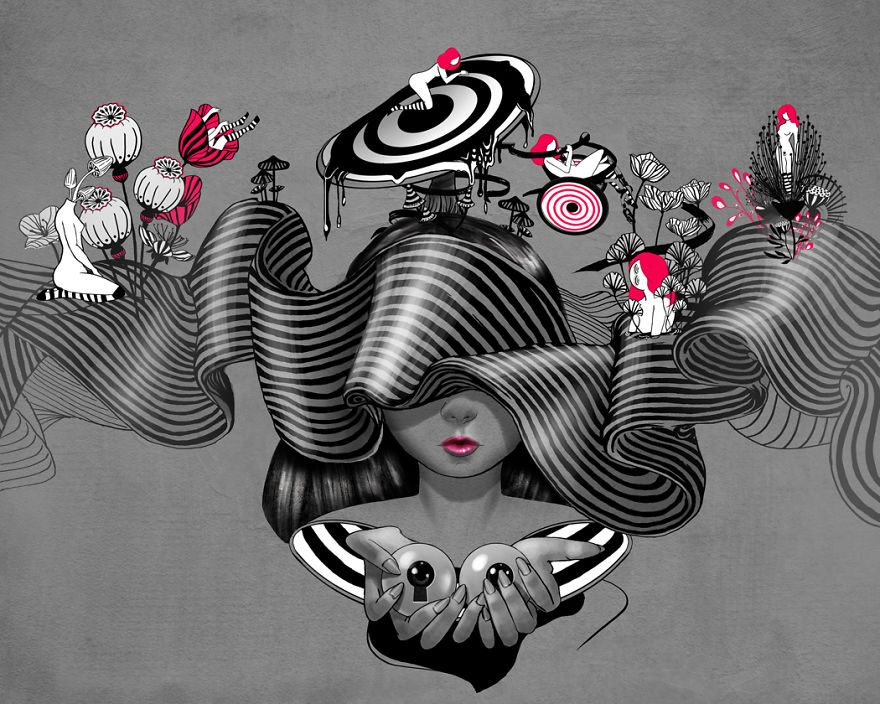
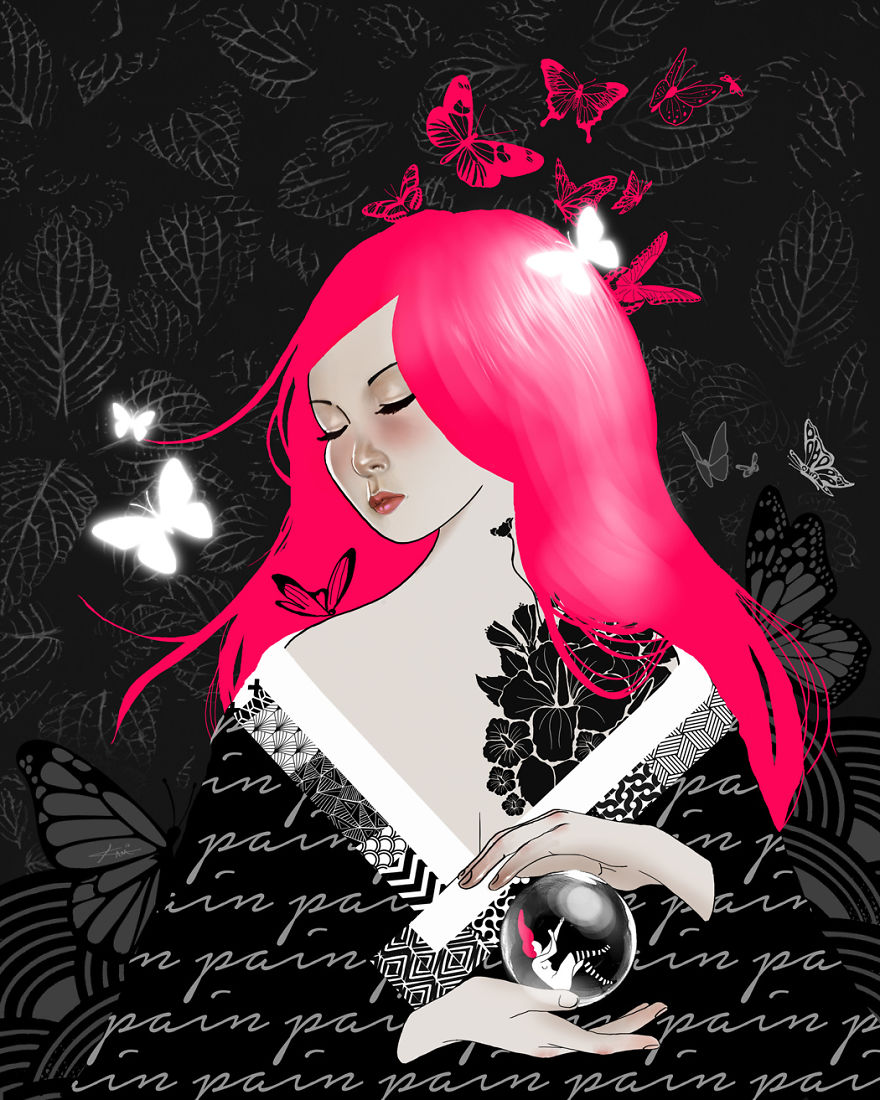


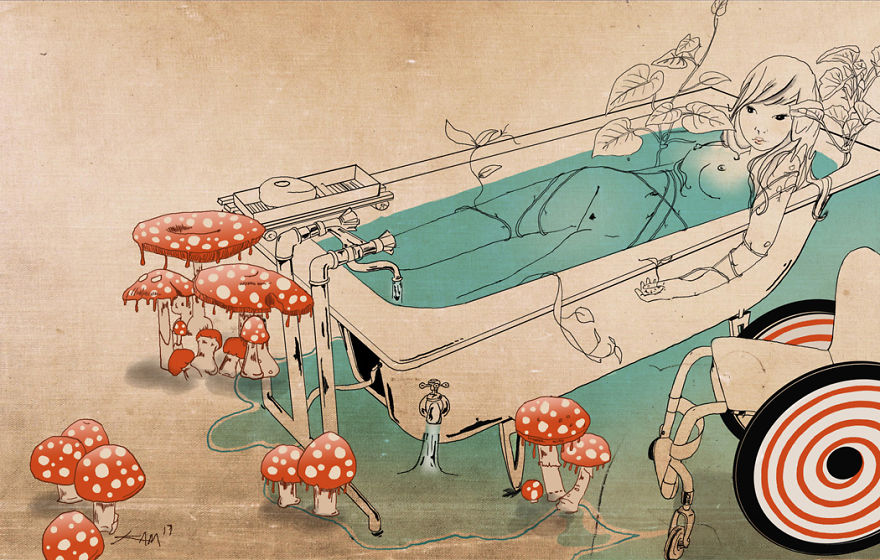
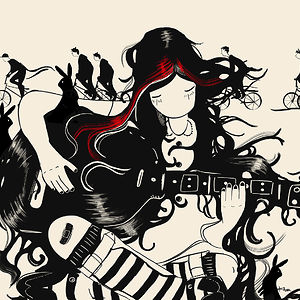










































186
27